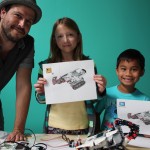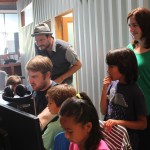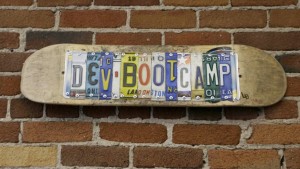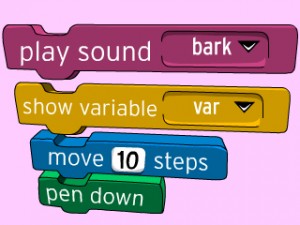 It’s well known that women statistically earn 78 percent of what their male counterparts earn throughout the workforce. Part of what contributes to this gap is the lack of women in certain industries that offer especially high earning jobs. Many organizations and institutions are making an effort to provide coding education to young women and girls in hopes of eradicating this disparity in the coming generation. One example of this is a coding class at Akron High School, according to Leigh Giangreco of the Buffalo News.
It’s well known that women statistically earn 78 percent of what their male counterparts earn throughout the workforce. Part of what contributes to this gap is the lack of women in certain industries that offer especially high earning jobs. Many organizations and institutions are making an effort to provide coding education to young women and girls in hopes of eradicating this disparity in the coming generation. One example of this is a coding class at Akron High School, according to Leigh Giangreco of the Buffalo News.
Giangreco writes, “Between 2013 and 2014, female participation in AP computer science tests increased by more than one-third, according to Education Week. But girls still make up only a small number of those test-takers, with 20 percent participation nationwide and just 18.4 percent in New York State. ‘There is nothing to stop a girl from signing up for a coding class,” Meek said. “The barriers are social.’ When Meek took his first high school computer science course in the 1980s, he said the field was just beginning to gain its geeky reputation. But with tech wizards such as Mark Zuckerberg emerging as billionaire moguls, the pendulum may be swinging the other way. In 2013, when Meek advertised an after-school coding program, more than 100 students signed up. At the end of the program, 97 percent of those surveyed agreed they needed the coding experience.”
When it comes to how the class functions, Giangreco writes, “The class uses tutorials from Hour of Code, a free online introduction to computer science, and Snap, a Berkeley-designed drag and drop program. Unlike language-centric programs such as Javascript or Python, which write the applications, Snap uses a simple building block method for coding. Meek admits the program is aimed at a middle school level, but said it provides a step toward more advanced coding. He also feels coding languages such as HTML will fade away to make room for a building block system.”
At CodeRev Kids, we also understand the importance of providing opportunities for young girls and others who are underrepresented in the tech fields to learn and master coding. To that end, we are beginning our coding program this April with the LAtinas, a group of high achieving female Latina high school students from underserved communities. The group is a branch of Google’s partner, the Hispanic Heritage Foundation. We will be building a prototype website together as the LAtinas learn to code, so not only will they be learning how to write code, but also how they can use it to attempt to solve a problem and even create a prototype which we will be partnering with Nation Builder for to attempt to turn the site into a real business that solves a societal problem.
Additionally, CodeREV is partnering with Microsoft to teach coding to 50 high school girls at Microsoft’s DigiGirlz event this May 16th. We are so excited for this exciting L.A. based Microsoft event!
Finally, we are implementing our “Ladies Night” coding jam sessions this month as well, and will be hosting female students who want to check out coding and see if they like it. We have a feeling many will.
We provide a host of programs that let students study everything from robotics to web development to app making.
Unlike other coding tutors, we customize our lessons to individual students’ expertise. We focus on Computational Thinking, which encompasses a wide range of programming concepts and languages.
In addition to our afterschool programs, we also offer spring and summer programs. Whatever youth coding education needs you might have, look no further than CodeRev Kids!







